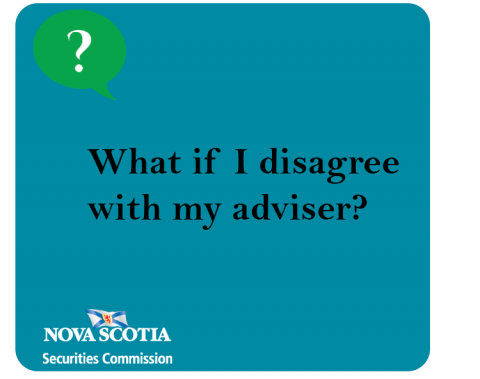Submitted by nsscadmin on

Disputes between advisers and their clients are rare, but they can occur. Even if an investor holds up their end of the adviser-client relationship and does all the necessary due diligence, disputes and problems can arise.
Investors should know their options, and what they can do should a problem arise.
Before you go forward with a complaint, first take a good hard look at whether there is a real problem that needs solving. Having a clear understanding of the roles and responsibilities in the adviser-client relationship will help. Our previous post provides helpful information: How do I find an adviser that’s right for me.
Losing money or seeing a decrease in the value of your investments may not necessarily be worth a complaint. Markets are unpredictable, even for the most seasoned adviser. Losing money does not necessarily mean negligence or fraud. Talk to your adviser, make sure you understand what happened and why, and if necessary, request changes to your investment profile, such as your risk tolerance.
Sometimes a complaint is necessary and legitimate. Encountering these types of concerns usually means you need to submit a complaint:
- Issues around registration, such as restrictions that were not communicated to you, or lack of registration altogether
- Unauthorized use of your money, such as withdrawals from your account or purchases of securities that you did not authorize
- Purchases or sales of investments that don’t seem to mesh with your investment goals or your risk tolerance
- Recommendations or suggestions to ‘make life easier for you,’ such as signing blank forms or providing cash or deposits directly into your advisors personal bank account
If any of these issues arise, the first step is to take your complaint to your adviser. Many disputes can be worked out with a conversation between a client and their adviser. If you’re not satisfied with the outcome of this conversation, your next step should be to contact the branch manager or compliance officer within your adviser’s firm. Registered firms often have well established policies and procedures for resolving disputes or complaints.
If you are still not satisfied. you can take your concerns to the self-regulatory organization under which your adviser and firm fall: either the Investment Industry Regulatory Organization of Canada or the Mutual Fund Dealers Association of Canada.
At any point during this process you can also raise you concerns with the Ombudsman for Banking Services and Investments, or with your provincial/territorial securities commission. OBSI may be able to assist you in recovering some of your financial losses. Your provincial/territorial securities commission will take action to deter your adviser/firm and others from engaging in similar activity.
To make a complaint directly to the Nova Scotia Securities Commission you can use our online form, or contact us by email. Be sure to give as much detail as possible. The information you provide will be used to determine what action, if any, can be taken. Someone from the commission will then contact you to discuss next steps. For more information on what to expect when making a complaint to the NSSC, please see our Guide for Complainants.
